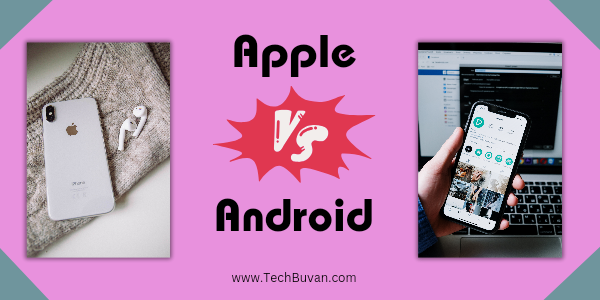Exploring the Distinctions Between Apple and Android Phones - Tech Buvan
Introduction:
In the modern smartphone landscape, two dominant players stand out: Apple's iPhone and a myriad of Android-based devices. These two platforms have distinctive characteristics that cater to diverse user preferences. This article delves into the core differences between Apple and Android phones, helping readers gain insights into their unique features and functionalities.
Operating Systems and Ecosystems
 |
| Apple Vs Android |
Apple iPhones:
Apple employs its proprietary iOS operating system, known for its seamless integration across devices. The closed ecosystem offers a consistent user experience with regular updates, ensuring optimal performance and security.
Android Phones:
Android phones, on the other hand, run on Google's Android OS. The open-source nature of Android allows for greater customization and device variety. However, this openness can sometimes result in fragmentation, with devices running different versions of the OS.
Hardware and Design
Apple iPhones:
Apple places a strong emphasis on design, resulting in sleek and premium-feeling devices. The company controls both hardware and software, leading to a harmonious blend that's optimized for performance and aesthetics.
Android Phones:
Android phones come from a multitude of manufacturers, resulting in diverse designs and build qualities. While this allows for a broader range of choices, it can also lead to inconsistency in terms of design and overall user experience.
App Ecosystem
Apple iPhones:
The App Store is renowned for its strict review process, ensuring that apps are high-quality and secure. While this provides users with a safer experience, it can also result in longer app approval times and limited customization.
Android Phones:
The Google Play Store offers a more relaxed app submission process, giving developers greater freedom. However, this leniency can lead to a higher likelihood of encountering malicious apps.
Customization and Personalization
Apple iPhones:
Customization options on iPhones are limited to changing wallpapers, rearranging icons, and selecting widgets. While this simplicity appeals to some users, those seeking extensive customization may find it lacking.
Android Phones:
Android's open nature allows for deep personalization through custom launchers, widgets, and themes. Users can tailor their devices to suit their preferences, making it an ideal choice for those who value individuality.
Integration with Other Devices
Apple iPhones:
Apple's ecosystem extends beyond phones, seamlessly integrating with other devices like Macs, iPads, and Apple Watches. Features like AirDrop and Handoff enhance cross-device functionality.
Android Phones:
While Android offers integration with other devices, it may not be as seamless as Apple's ecosystem due to the variety of manufacturers and software versions. Services like Google Drive, however, help bridge this gap to some extent.
Also Read : How to choose best Mobile Phone (17 Secret tips) - Tech Buvan
Pricing and Accessibility
Apple iPhones:
Apple's devices are often perceived as premium and come with a higher price tag. This exclusivity can limit accessibility to certain segments of the population.
Android Phones:
The diverse range of Android phones spans various price points, making it more accessible to a broader audience. Users can choose devices that align with their budget and feature preferences.
Key difference between Apple and Android:
1. Operating Systems:
2. App Stores:
3. Customization:
4. Hardware and Ecosystem:
5. Price Range:
6. Privacy and Security:
7. Updates:
8. Integration with Ecosystem:
9. Voice Assistants:
10. Availability:
Also Read : Ms Excel vs Google sheets ( Full comparison guide)- TechBuvan
Conclusion: Making the Choice
In the realm of smartphones, the choice between Apple and Android ultimately boils down to personal preferences and priorities. Apple offers a controlled and consistent ecosystem, premium design, and a focus on security. On the other hand, Android provides greater customization, device variety, and accessibility across price points. As both platforms continue to evolve, users can confidently select the option that aligns with their individual needs and preferences.
This article comprehensively covers the key differences between Apple and Android phones, providing readers with valuable insights into the distinct characteristics of these two dominant smartphone platforms.
